Leadership, LMX, PsyCap: An Analysis of Employee Performance
VerifiedAdded on 2023/05/30
|8
|2402
|497
Essay
AI Summary
This essay delves into the multifaceted impact of leadership on business success, focusing on the interplay between authentic leadership, Leader-Member Exchange (LMX), and employees' Psychological Capital (PsyCap). It begins by defining these concepts and their interconnectedness, emphasizing the role of ethics. The essay then reviews literature on building PsyCap among different employee groups, specifically contrasting blue-collar and white-collar workers, and examines the influence of emotions on employee performance, referencing the PERMA model. It concludes that a well-designed training, mentoring, and counseling process helps the leaders to instill a congenial work culture within the organization which ultimately boosts up the employee morale and motivation level and enhances their individual PsyCap. The essay highlights the importance of leaders understanding and managing the emotional aspects of their workforce, which is critical for overall organizational success. The essay emphasizes that well-managed corporate governance with sound and moral leadership may significantly contribute towards the corporate goal of attainment of the objective in a more effective manner in the long-run for the business as well as the society as a whole.
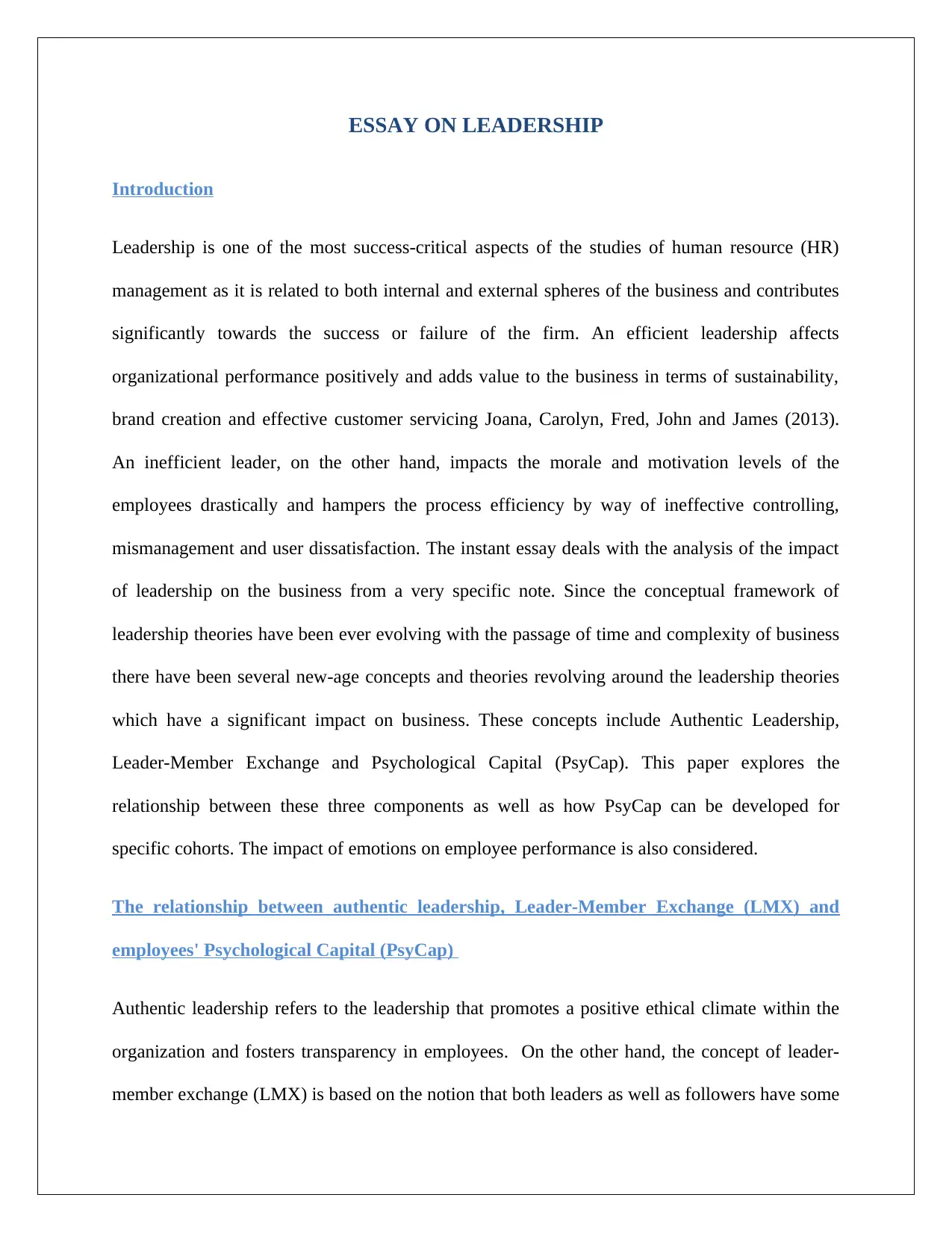
ESSAY ON LEADERSHIP
Introduction
Leadership is one of the most success-critical aspects of the studies of human resource (HR)
management as it is related to both internal and external spheres of the business and contributes
significantly towards the success or failure of the firm. An efficient leadership affects
organizational performance positively and adds value to the business in terms of sustainability,
brand creation and effective customer servicing Joana, Carolyn, Fred, John and James (2013).
An inefficient leader, on the other hand, impacts the morale and motivation levels of the
employees drastically and hampers the process efficiency by way of ineffective controlling,
mismanagement and user dissatisfaction. The instant essay deals with the analysis of the impact
of leadership on the business from a very specific note. Since the conceptual framework of
leadership theories have been ever evolving with the passage of time and complexity of business
there have been several new-age concepts and theories revolving around the leadership theories
which have a significant impact on business. These concepts include Authentic Leadership,
Leader-Member Exchange and Psychological Capital (PsyCap). This paper explores the
relationship between these three components as well as how PsyCap can be developed for
specific cohorts. The impact of emotions on employee performance is also considered.
The relationship between authentic leadership, Leader-Member Exchange (LMX) and
employees' Psychological Capital (PsyCap)
Authentic leadership refers to the leadership that promotes a positive ethical climate within the
organization and fosters transparency in employees. On the other hand, the concept of leader-
member exchange (LMX) is based on the notion that both leaders as well as followers have some
Introduction
Leadership is one of the most success-critical aspects of the studies of human resource (HR)
management as it is related to both internal and external spheres of the business and contributes
significantly towards the success or failure of the firm. An efficient leadership affects
organizational performance positively and adds value to the business in terms of sustainability,
brand creation and effective customer servicing Joana, Carolyn, Fred, John and James (2013).
An inefficient leader, on the other hand, impacts the morale and motivation levels of the
employees drastically and hampers the process efficiency by way of ineffective controlling,
mismanagement and user dissatisfaction. The instant essay deals with the analysis of the impact
of leadership on the business from a very specific note. Since the conceptual framework of
leadership theories have been ever evolving with the passage of time and complexity of business
there have been several new-age concepts and theories revolving around the leadership theories
which have a significant impact on business. These concepts include Authentic Leadership,
Leader-Member Exchange and Psychological Capital (PsyCap). This paper explores the
relationship between these three components as well as how PsyCap can be developed for
specific cohorts. The impact of emotions on employee performance is also considered.
The relationship between authentic leadership, Leader-Member Exchange (LMX) and
employees' Psychological Capital (PsyCap)
Authentic leadership refers to the leadership that promotes a positive ethical climate within the
organization and fosters transparency in employees. On the other hand, the concept of leader-
member exchange (LMX) is based on the notion that both leaders as well as followers have some
Paraphrase This Document
Need a fresh take? Get an instant paraphrase of this document with our AI Paraphraser
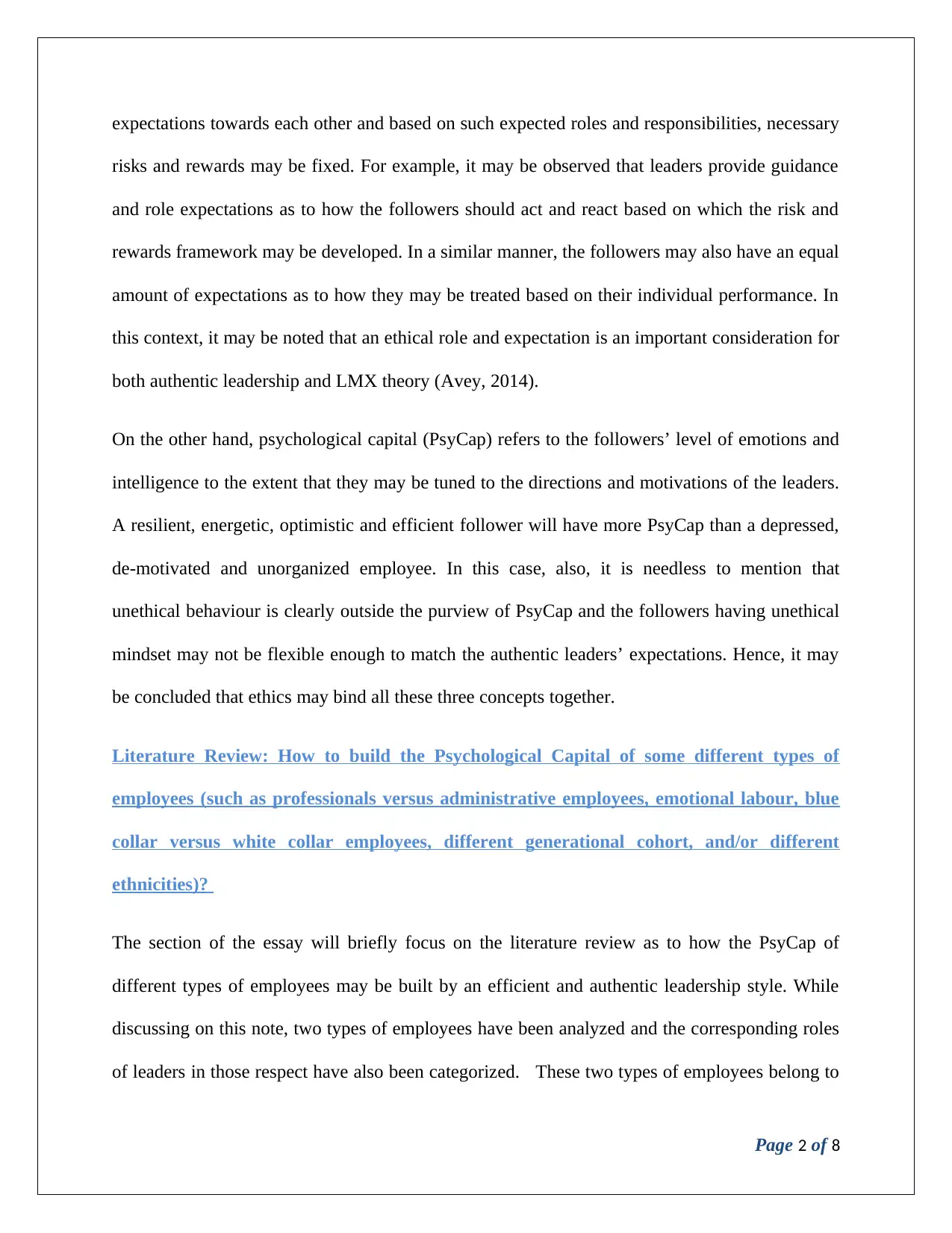
expectations towards each other and based on such expected roles and responsibilities, necessary
risks and rewards may be fixed. For example, it may be observed that leaders provide guidance
and role expectations as to how the followers should act and react based on which the risk and
rewards framework may be developed. In a similar manner, the followers may also have an equal
amount of expectations as to how they may be treated based on their individual performance. In
this context, it may be noted that an ethical role and expectation is an important consideration for
both authentic leadership and LMX theory (Avey, 2014).
On the other hand, psychological capital (PsyCap) refers to the followers’ level of emotions and
intelligence to the extent that they may be tuned to the directions and motivations of the leaders.
A resilient, energetic, optimistic and efficient follower will have more PsyCap than a depressed,
de-motivated and unorganized employee. In this case, also, it is needless to mention that
unethical behaviour is clearly outside the purview of PsyCap and the followers having unethical
mindset may not be flexible enough to match the authentic leaders’ expectations. Hence, it may
be concluded that ethics may bind all these three concepts together.
Literature Review: How to build the Psychological Capital of some different types of
employees (such as professionals versus administrative employees, emotional labour, blue
collar versus white collar employees, different generational cohort, and/or different
ethnicities)?
The section of the essay will briefly focus on the literature review as to how the PsyCap of
different types of employees may be built by an efficient and authentic leadership style. While
discussing on this note, two types of employees have been analyzed and the corresponding roles
of leaders in those respect have also been categorized. These two types of employees belong to
Page 2 of 8
risks and rewards may be fixed. For example, it may be observed that leaders provide guidance
and role expectations as to how the followers should act and react based on which the risk and
rewards framework may be developed. In a similar manner, the followers may also have an equal
amount of expectations as to how they may be treated based on their individual performance. In
this context, it may be noted that an ethical role and expectation is an important consideration for
both authentic leadership and LMX theory (Avey, 2014).
On the other hand, psychological capital (PsyCap) refers to the followers’ level of emotions and
intelligence to the extent that they may be tuned to the directions and motivations of the leaders.
A resilient, energetic, optimistic and efficient follower will have more PsyCap than a depressed,
de-motivated and unorganized employee. In this case, also, it is needless to mention that
unethical behaviour is clearly outside the purview of PsyCap and the followers having unethical
mindset may not be flexible enough to match the authentic leaders’ expectations. Hence, it may
be concluded that ethics may bind all these three concepts together.
Literature Review: How to build the Psychological Capital of some different types of
employees (such as professionals versus administrative employees, emotional labour, blue
collar versus white collar employees, different generational cohort, and/or different
ethnicities)?
The section of the essay will briefly focus on the literature review as to how the PsyCap of
different types of employees may be built by an efficient and authentic leadership style. While
discussing on this note, two types of employees have been analyzed and the corresponding roles
of leaders in those respect have also been categorized. These two types of employees belong to
Page 2 of 8
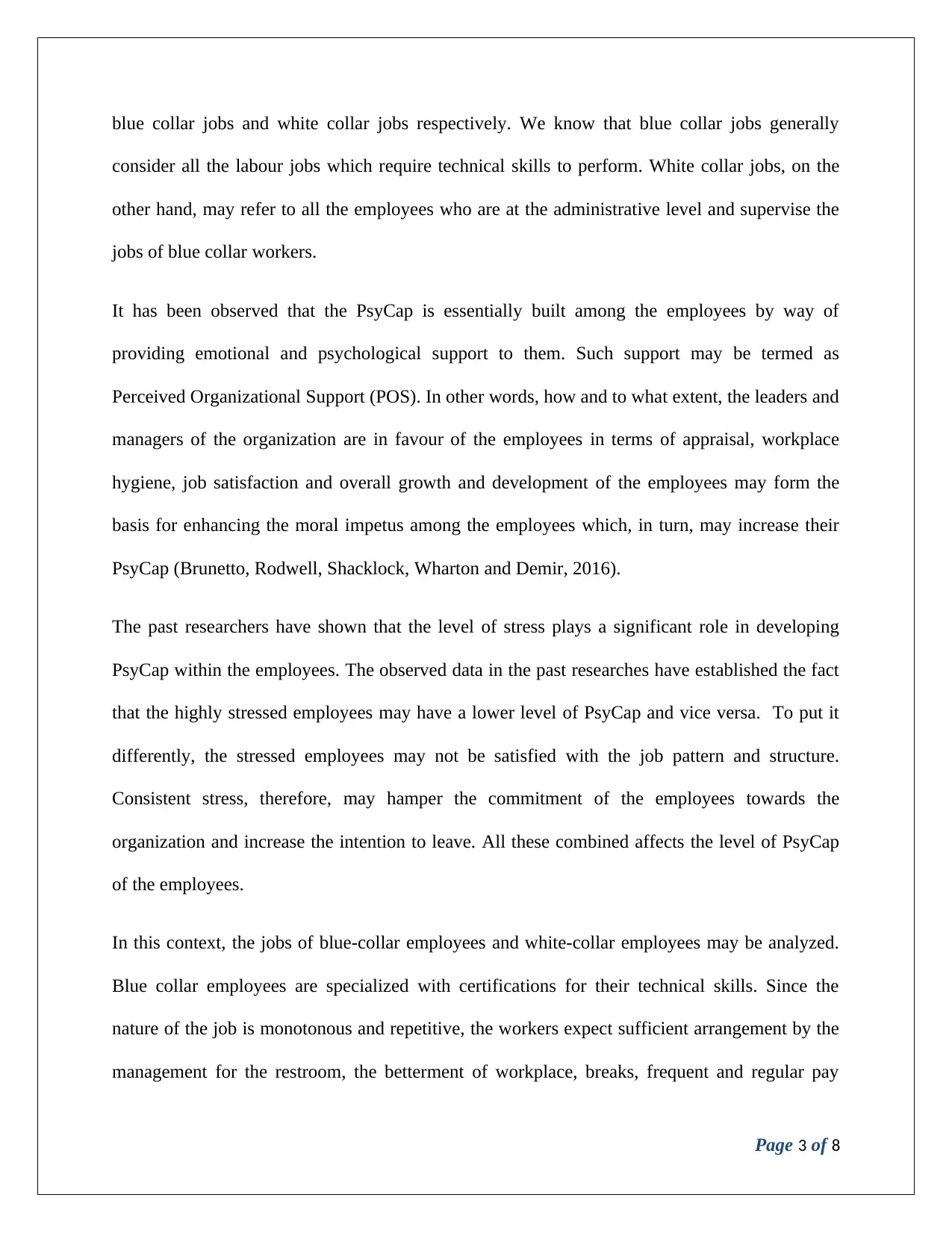
blue collar jobs and white collar jobs respectively. We know that blue collar jobs generally
consider all the labour jobs which require technical skills to perform. White collar jobs, on the
other hand, may refer to all the employees who are at the administrative level and supervise the
jobs of blue collar workers.
It has been observed that the PsyCap is essentially built among the employees by way of
providing emotional and psychological support to them. Such support may be termed as
Perceived Organizational Support (POS). In other words, how and to what extent, the leaders and
managers of the organization are in favour of the employees in terms of appraisal, workplace
hygiene, job satisfaction and overall growth and development of the employees may form the
basis for enhancing the moral impetus among the employees which, in turn, may increase their
PsyCap (Brunetto, Rodwell, Shacklock, Wharton and Demir, 2016).
The past researchers have shown that the level of stress plays a significant role in developing
PsyCap within the employees. The observed data in the past researches have established the fact
that the highly stressed employees may have a lower level of PsyCap and vice versa. To put it
differently, the stressed employees may not be satisfied with the job pattern and structure.
Consistent stress, therefore, may hamper the commitment of the employees towards the
organization and increase the intention to leave. All these combined affects the level of PsyCap
of the employees.
In this context, the jobs of blue-collar employees and white-collar employees may be analyzed.
Blue collar employees are specialized with certifications for their technical skills. Since the
nature of the job is monotonous and repetitive, the workers expect sufficient arrangement by the
management for the restroom, the betterment of workplace, breaks, frequent and regular pay
Page 3 of 8
consider all the labour jobs which require technical skills to perform. White collar jobs, on the
other hand, may refer to all the employees who are at the administrative level and supervise the
jobs of blue collar workers.
It has been observed that the PsyCap is essentially built among the employees by way of
providing emotional and psychological support to them. Such support may be termed as
Perceived Organizational Support (POS). In other words, how and to what extent, the leaders and
managers of the organization are in favour of the employees in terms of appraisal, workplace
hygiene, job satisfaction and overall growth and development of the employees may form the
basis for enhancing the moral impetus among the employees which, in turn, may increase their
PsyCap (Brunetto, Rodwell, Shacklock, Wharton and Demir, 2016).
The past researchers have shown that the level of stress plays a significant role in developing
PsyCap within the employees. The observed data in the past researches have established the fact
that the highly stressed employees may have a lower level of PsyCap and vice versa. To put it
differently, the stressed employees may not be satisfied with the job pattern and structure.
Consistent stress, therefore, may hamper the commitment of the employees towards the
organization and increase the intention to leave. All these combined affects the level of PsyCap
of the employees.
In this context, the jobs of blue-collar employees and white-collar employees may be analyzed.
Blue collar employees are specialized with certifications for their technical skills. Since the
nature of the job is monotonous and repetitive, the workers expect sufficient arrangement by the
management for the restroom, the betterment of workplace, breaks, frequent and regular pay
Page 3 of 8
⊘ This is a preview!⊘
Do you want full access?
Subscribe today to unlock all pages.

Trusted by 1+ million students worldwide
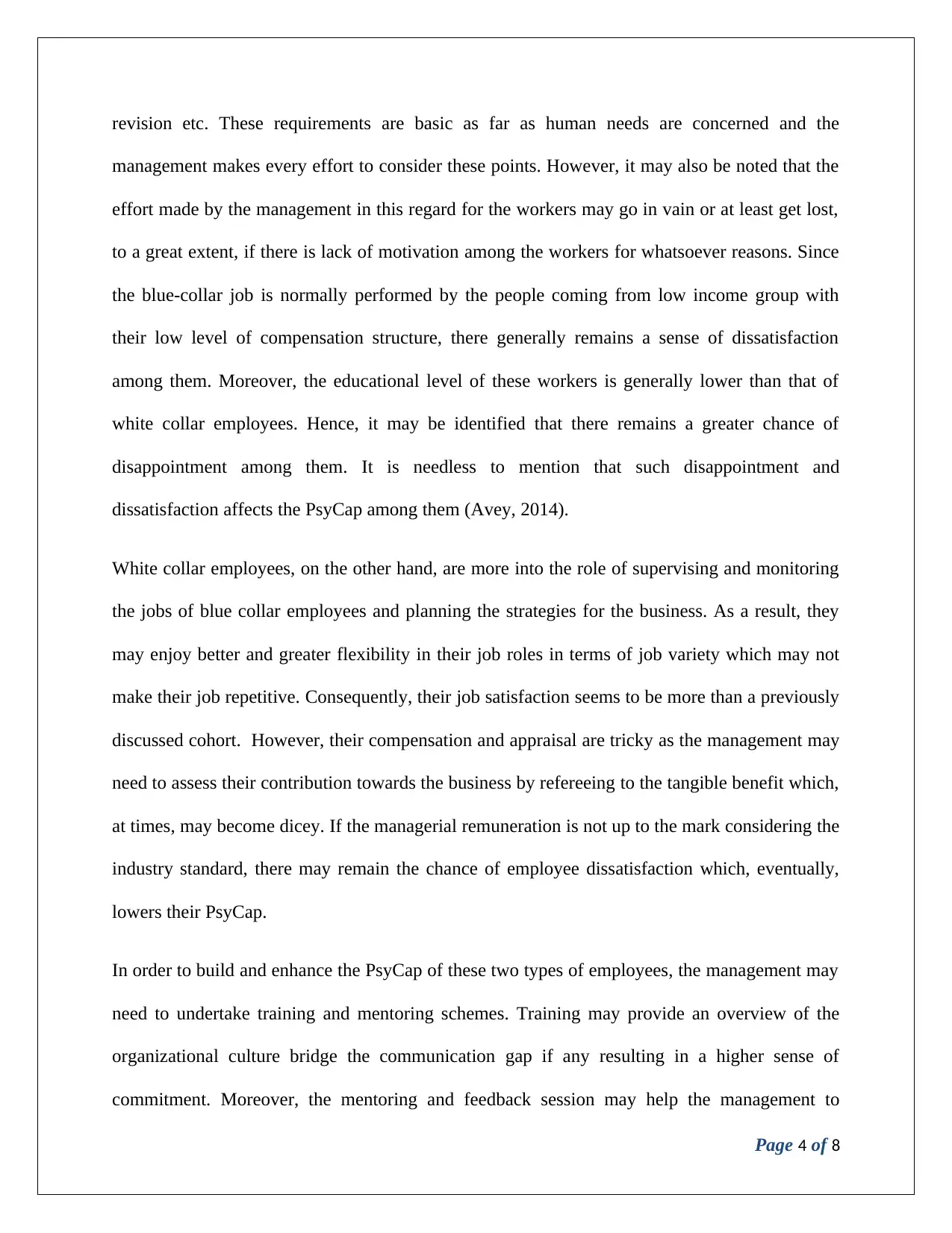
revision etc. These requirements are basic as far as human needs are concerned and the
management makes every effort to consider these points. However, it may also be noted that the
effort made by the management in this regard for the workers may go in vain or at least get lost,
to a great extent, if there is lack of motivation among the workers for whatsoever reasons. Since
the blue-collar job is normally performed by the people coming from low income group with
their low level of compensation structure, there generally remains a sense of dissatisfaction
among them. Moreover, the educational level of these workers is generally lower than that of
white collar employees. Hence, it may be identified that there remains a greater chance of
disappointment among them. It is needless to mention that such disappointment and
dissatisfaction affects the PsyCap among them (Avey, 2014).
White collar employees, on the other hand, are more into the role of supervising and monitoring
the jobs of blue collar employees and planning the strategies for the business. As a result, they
may enjoy better and greater flexibility in their job roles in terms of job variety which may not
make their job repetitive. Consequently, their job satisfaction seems to be more than a previously
discussed cohort. However, their compensation and appraisal are tricky as the management may
need to assess their contribution towards the business by refereeing to the tangible benefit which,
at times, may become dicey. If the managerial remuneration is not up to the mark considering the
industry standard, there may remain the chance of employee dissatisfaction which, eventually,
lowers their PsyCap.
In order to build and enhance the PsyCap of these two types of employees, the management may
need to undertake training and mentoring schemes. Training may provide an overview of the
organizational culture bridge the communication gap if any resulting in a higher sense of
commitment. Moreover, the mentoring and feedback session may help the management to
Page 4 of 8
management makes every effort to consider these points. However, it may also be noted that the
effort made by the management in this regard for the workers may go in vain or at least get lost,
to a great extent, if there is lack of motivation among the workers for whatsoever reasons. Since
the blue-collar job is normally performed by the people coming from low income group with
their low level of compensation structure, there generally remains a sense of dissatisfaction
among them. Moreover, the educational level of these workers is generally lower than that of
white collar employees. Hence, it may be identified that there remains a greater chance of
disappointment among them. It is needless to mention that such disappointment and
dissatisfaction affects the PsyCap among them (Avey, 2014).
White collar employees, on the other hand, are more into the role of supervising and monitoring
the jobs of blue collar employees and planning the strategies for the business. As a result, they
may enjoy better and greater flexibility in their job roles in terms of job variety which may not
make their job repetitive. Consequently, their job satisfaction seems to be more than a previously
discussed cohort. However, their compensation and appraisal are tricky as the management may
need to assess their contribution towards the business by refereeing to the tangible benefit which,
at times, may become dicey. If the managerial remuneration is not up to the mark considering the
industry standard, there may remain the chance of employee dissatisfaction which, eventually,
lowers their PsyCap.
In order to build and enhance the PsyCap of these two types of employees, the management may
need to undertake training and mentoring schemes. Training may provide an overview of the
organizational culture bridge the communication gap if any resulting in a higher sense of
commitment. Moreover, the mentoring and feedback session may help the management to
Page 4 of 8
Paraphrase This Document
Need a fresh take? Get an instant paraphrase of this document with our AI Paraphraser
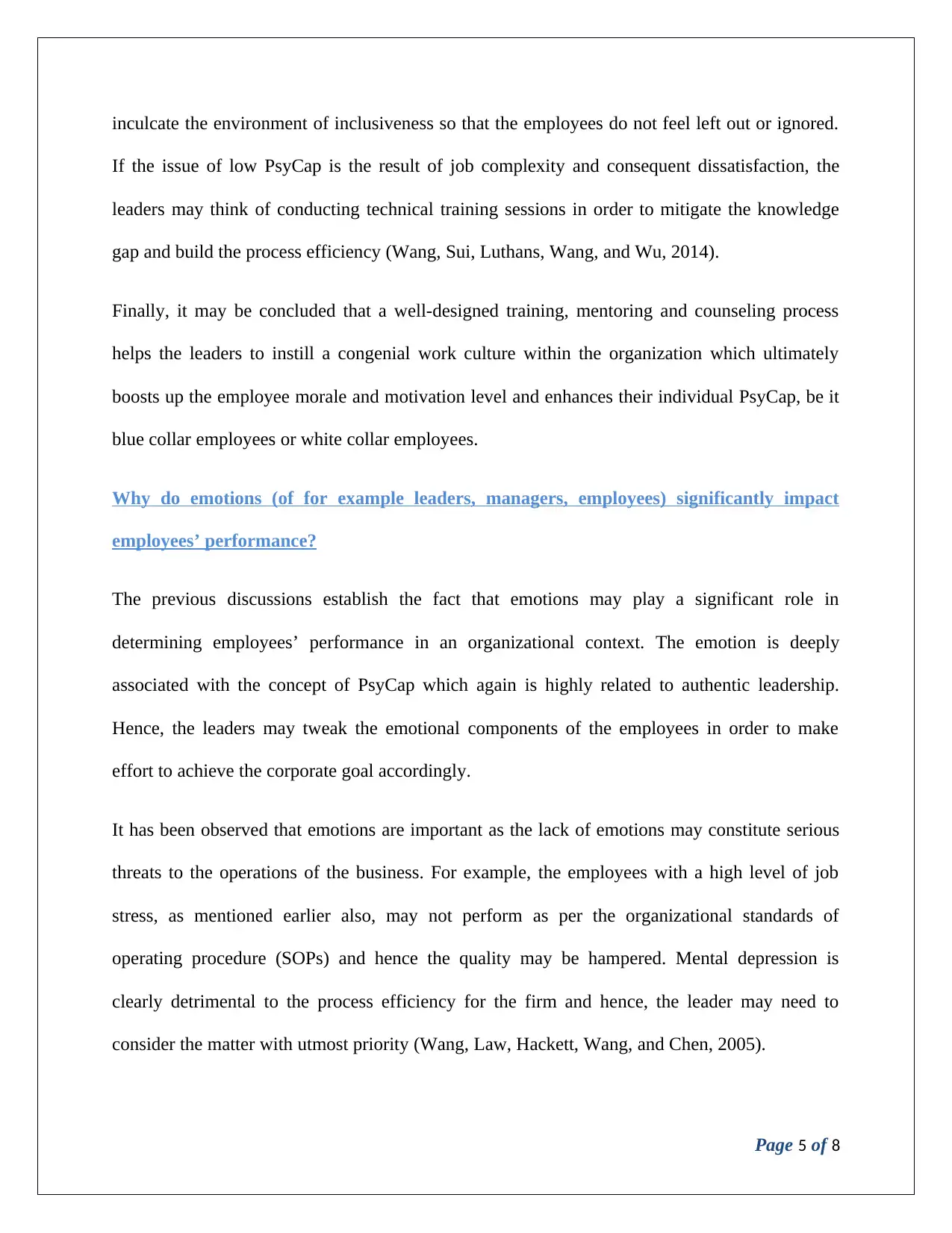
inculcate the environment of inclusiveness so that the employees do not feel left out or ignored.
If the issue of low PsyCap is the result of job complexity and consequent dissatisfaction, the
leaders may think of conducting technical training sessions in order to mitigate the knowledge
gap and build the process efficiency (Wang, Sui, Luthans, Wang, and Wu, 2014).
Finally, it may be concluded that a well-designed training, mentoring and counseling process
helps the leaders to instill a congenial work culture within the organization which ultimately
boosts up the employee morale and motivation level and enhances their individual PsyCap, be it
blue collar employees or white collar employees.
Why do emotions (of for example leaders, managers, employees) significantly impact
employees’ performance?
The previous discussions establish the fact that emotions may play a significant role in
determining employees’ performance in an organizational context. The emotion is deeply
associated with the concept of PsyCap which again is highly related to authentic leadership.
Hence, the leaders may tweak the emotional components of the employees in order to make
effort to achieve the corporate goal accordingly.
It has been observed that emotions are important as the lack of emotions may constitute serious
threats to the operations of the business. For example, the employees with a high level of job
stress, as mentioned earlier also, may not perform as per the organizational standards of
operating procedure (SOPs) and hence the quality may be hampered. Mental depression is
clearly detrimental to the process efficiency for the firm and hence, the leader may need to
consider the matter with utmost priority (Wang, Law, Hackett, Wang, and Chen, 2005).
Page 5 of 8
If the issue of low PsyCap is the result of job complexity and consequent dissatisfaction, the
leaders may think of conducting technical training sessions in order to mitigate the knowledge
gap and build the process efficiency (Wang, Sui, Luthans, Wang, and Wu, 2014).
Finally, it may be concluded that a well-designed training, mentoring and counseling process
helps the leaders to instill a congenial work culture within the organization which ultimately
boosts up the employee morale and motivation level and enhances their individual PsyCap, be it
blue collar employees or white collar employees.
Why do emotions (of for example leaders, managers, employees) significantly impact
employees’ performance?
The previous discussions establish the fact that emotions may play a significant role in
determining employees’ performance in an organizational context. The emotion is deeply
associated with the concept of PsyCap which again is highly related to authentic leadership.
Hence, the leaders may tweak the emotional components of the employees in order to make
effort to achieve the corporate goal accordingly.
It has been observed that emotions are important as the lack of emotions may constitute serious
threats to the operations of the business. For example, the employees with a high level of job
stress, as mentioned earlier also, may not perform as per the organizational standards of
operating procedure (SOPs) and hence the quality may be hampered. Mental depression is
clearly detrimental to the process efficiency for the firm and hence, the leader may need to
consider the matter with utmost priority (Wang, Law, Hackett, Wang, and Chen, 2005).
Page 5 of 8
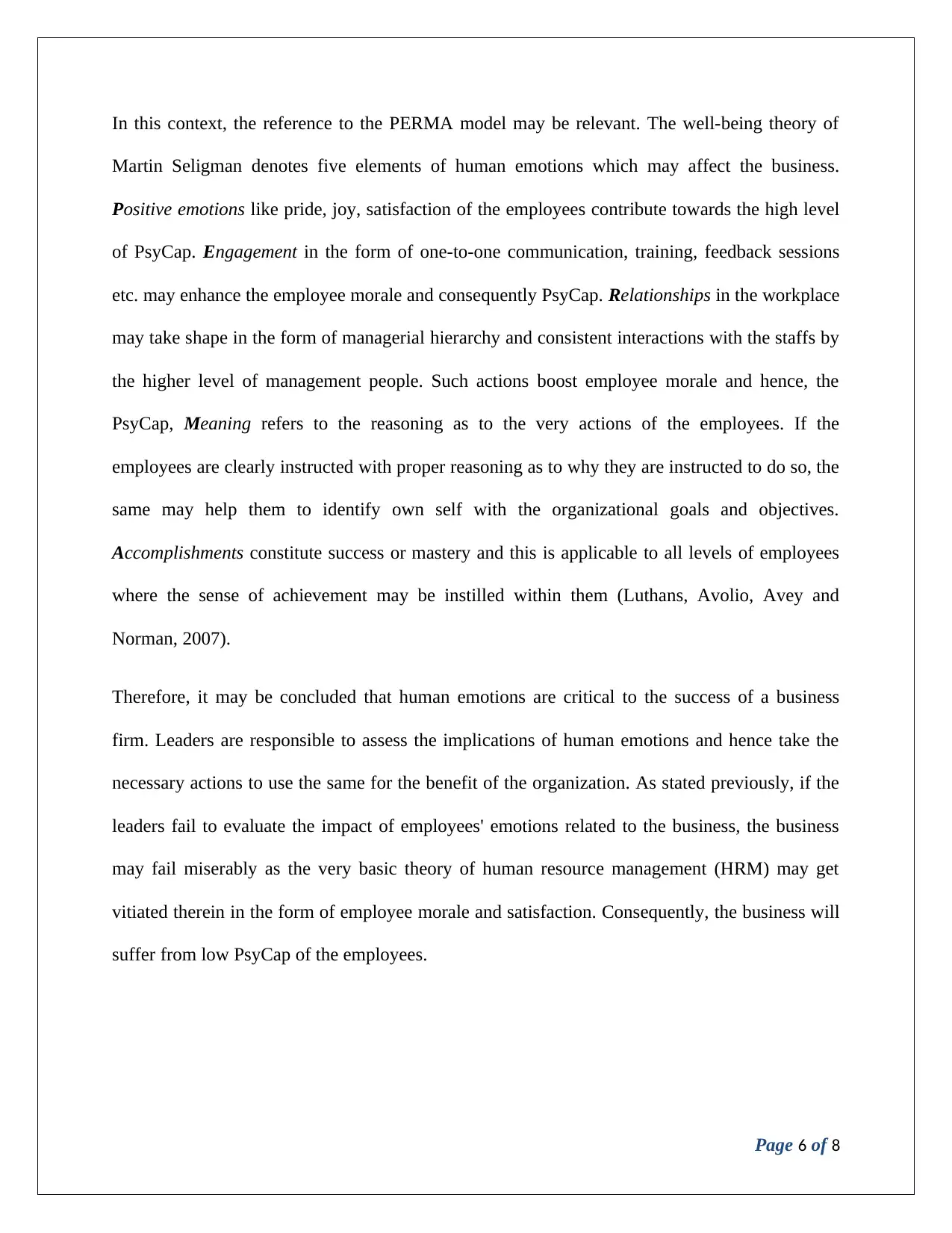
In this context, the reference to the PERMA model may be relevant. The well-being theory of
Martin Seligman denotes five elements of human emotions which may affect the business.
Positive emotions like pride, joy, satisfaction of the employees contribute towards the high level
of PsyCap. Engagement in the form of one-to-one communication, training, feedback sessions
etc. may enhance the employee morale and consequently PsyCap. Relationships in the workplace
may take shape in the form of managerial hierarchy and consistent interactions with the staffs by
the higher level of management people. Such actions boost employee morale and hence, the
PsyCap, Meaning refers to the reasoning as to the very actions of the employees. If the
employees are clearly instructed with proper reasoning as to why they are instructed to do so, the
same may help them to identify own self with the organizational goals and objectives.
Accomplishments constitute success or mastery and this is applicable to all levels of employees
where the sense of achievement may be instilled within them (Luthans, Avolio, Avey and
Norman, 2007).
Therefore, it may be concluded that human emotions are critical to the success of a business
firm. Leaders are responsible to assess the implications of human emotions and hence take the
necessary actions to use the same for the benefit of the organization. As stated previously, if the
leaders fail to evaluate the impact of employees' emotions related to the business, the business
may fail miserably as the very basic theory of human resource management (HRM) may get
vitiated therein in the form of employee morale and satisfaction. Consequently, the business will
suffer from low PsyCap of the employees.
Page 6 of 8
Martin Seligman denotes five elements of human emotions which may affect the business.
Positive emotions like pride, joy, satisfaction of the employees contribute towards the high level
of PsyCap. Engagement in the form of one-to-one communication, training, feedback sessions
etc. may enhance the employee morale and consequently PsyCap. Relationships in the workplace
may take shape in the form of managerial hierarchy and consistent interactions with the staffs by
the higher level of management people. Such actions boost employee morale and hence, the
PsyCap, Meaning refers to the reasoning as to the very actions of the employees. If the
employees are clearly instructed with proper reasoning as to why they are instructed to do so, the
same may help them to identify own self with the organizational goals and objectives.
Accomplishments constitute success or mastery and this is applicable to all levels of employees
where the sense of achievement may be instilled within them (Luthans, Avolio, Avey and
Norman, 2007).
Therefore, it may be concluded that human emotions are critical to the success of a business
firm. Leaders are responsible to assess the implications of human emotions and hence take the
necessary actions to use the same for the benefit of the organization. As stated previously, if the
leaders fail to evaluate the impact of employees' emotions related to the business, the business
may fail miserably as the very basic theory of human resource management (HRM) may get
vitiated therein in the form of employee morale and satisfaction. Consequently, the business will
suffer from low PsyCap of the employees.
Page 6 of 8
⊘ This is a preview!⊘
Do you want full access?
Subscribe today to unlock all pages.

Trusted by 1+ million students worldwide
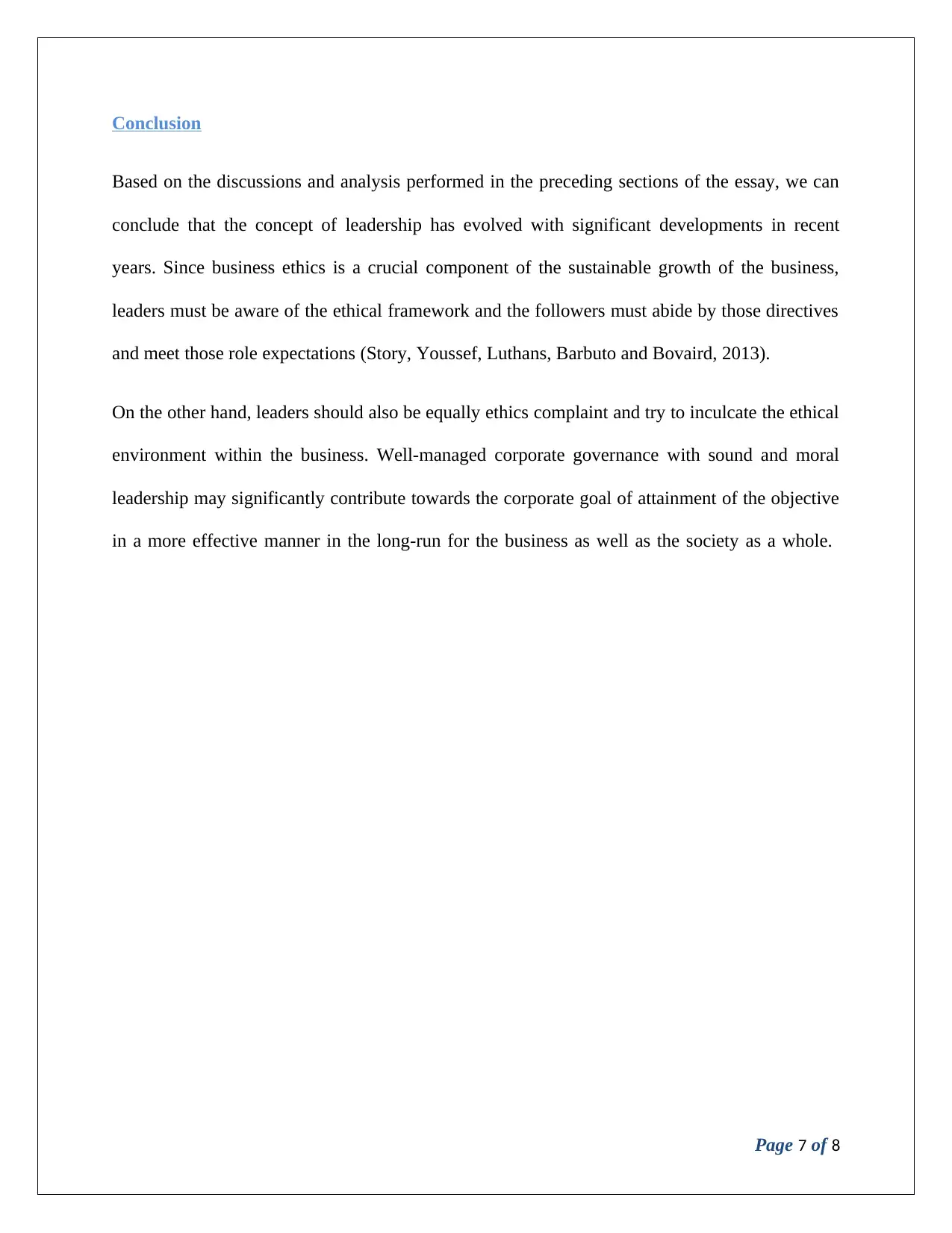
Conclusion
Based on the discussions and analysis performed in the preceding sections of the essay, we can
conclude that the concept of leadership has evolved with significant developments in recent
years. Since business ethics is a crucial component of the sustainable growth of the business,
leaders must be aware of the ethical framework and the followers must abide by those directives
and meet those role expectations (Story, Youssef, Luthans, Barbuto and Bovaird, 2013).
On the other hand, leaders should also be equally ethics complaint and try to inculcate the ethical
environment within the business. Well-managed corporate governance with sound and moral
leadership may significantly contribute towards the corporate goal of attainment of the objective
in a more effective manner in the long-run for the business as well as the society as a whole.
Page 7 of 8
Based on the discussions and analysis performed in the preceding sections of the essay, we can
conclude that the concept of leadership has evolved with significant developments in recent
years. Since business ethics is a crucial component of the sustainable growth of the business,
leaders must be aware of the ethical framework and the followers must abide by those directives
and meet those role expectations (Story, Youssef, Luthans, Barbuto and Bovaird, 2013).
On the other hand, leaders should also be equally ethics complaint and try to inculcate the ethical
environment within the business. Well-managed corporate governance with sound and moral
leadership may significantly contribute towards the corporate goal of attainment of the objective
in a more effective manner in the long-run for the business as well as the society as a whole.
Page 7 of 8
Paraphrase This Document
Need a fresh take? Get an instant paraphrase of this document with our AI Paraphraser
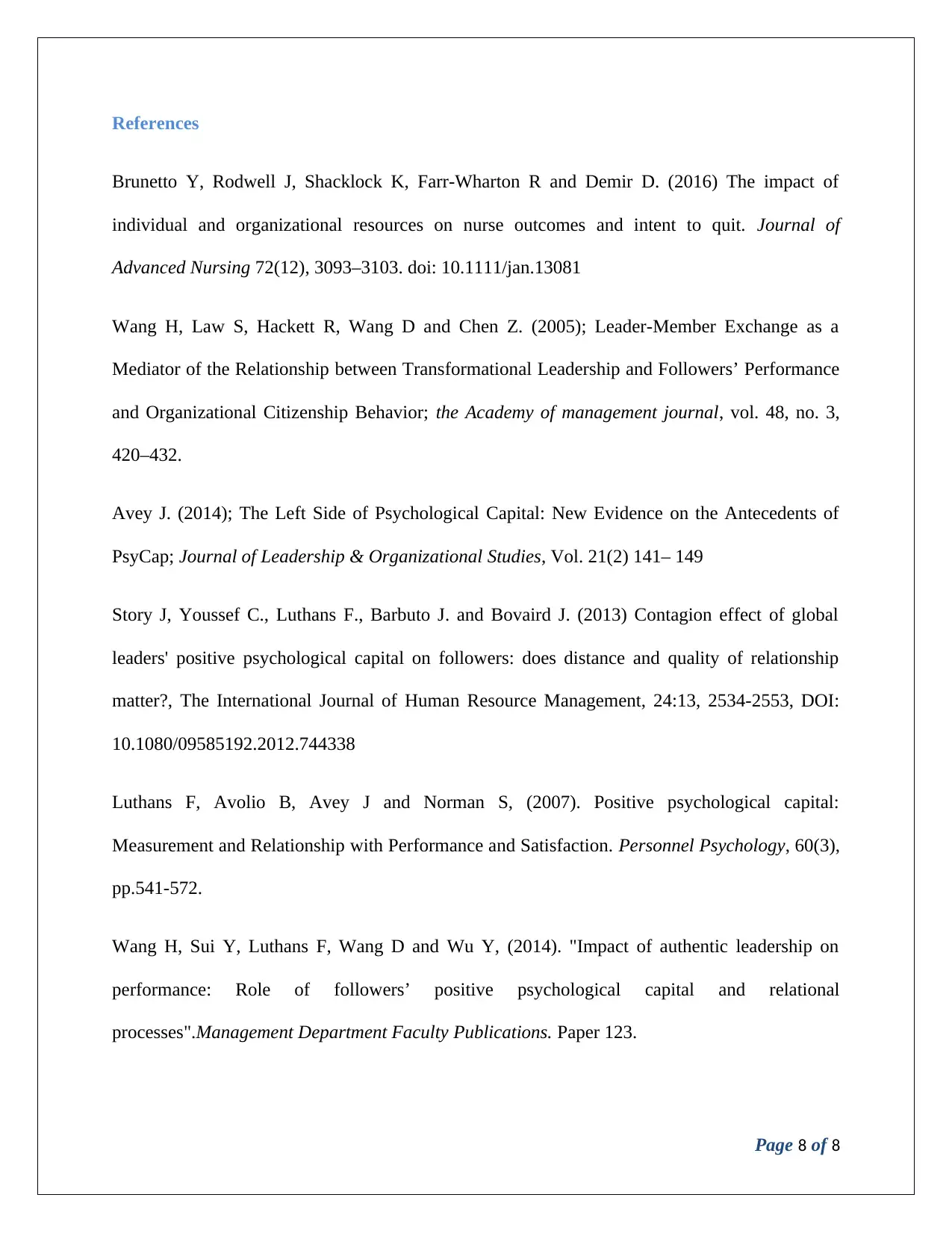
References
Brunetto Y, Rodwell J, Shacklock K, Farr-Wharton R and Demir D. (2016) The impact of
individual and organizational resources on nurse outcomes and intent to quit. Journal of
Advanced Nursing 72(12), 3093–3103. doi: 10.1111/jan.13081
Wang H, Law S, Hackett R, Wang D and Chen Z. (2005); Leader-Member Exchange as a
Mediator of the Relationship between Transformational Leadership and Followers’ Performance
and Organizational Citizenship Behavior; the Academy of management journal, vol. 48, no. 3,
420–432.
Avey J. (2014); The Left Side of Psychological Capital: New Evidence on the Antecedents of
PsyCap; Journal of Leadership & Organizational Studies, Vol. 21(2) 141– 149
Story J, Youssef C., Luthans F., Barbuto J. and Bovaird J. (2013) Contagion effect of global
leaders' positive psychological capital on followers: does distance and quality of relationship
matter?, The International Journal of Human Resource Management, 24:13, 2534-2553, DOI:
10.1080/09585192.2012.744338
Luthans F, Avolio B, Avey J and Norman S, (2007). Positive psychological capital:
Measurement and Relationship with Performance and Satisfaction. Personnel Psychology, 60(3),
pp.541-572.
Wang H, Sui Y, Luthans F, Wang D and Wu Y, (2014). "Impact of authentic leadership on
performance: Role of followers’ positive psychological capital and relational
processes".Management Department Faculty Publications. Paper 123.
Page 8 of 8
Brunetto Y, Rodwell J, Shacklock K, Farr-Wharton R and Demir D. (2016) The impact of
individual and organizational resources on nurse outcomes and intent to quit. Journal of
Advanced Nursing 72(12), 3093–3103. doi: 10.1111/jan.13081
Wang H, Law S, Hackett R, Wang D and Chen Z. (2005); Leader-Member Exchange as a
Mediator of the Relationship between Transformational Leadership and Followers’ Performance
and Organizational Citizenship Behavior; the Academy of management journal, vol. 48, no. 3,
420–432.
Avey J. (2014); The Left Side of Psychological Capital: New Evidence on the Antecedents of
PsyCap; Journal of Leadership & Organizational Studies, Vol. 21(2) 141– 149
Story J, Youssef C., Luthans F., Barbuto J. and Bovaird J. (2013) Contagion effect of global
leaders' positive psychological capital on followers: does distance and quality of relationship
matter?, The International Journal of Human Resource Management, 24:13, 2534-2553, DOI:
10.1080/09585192.2012.744338
Luthans F, Avolio B, Avey J and Norman S, (2007). Positive psychological capital:
Measurement and Relationship with Performance and Satisfaction. Personnel Psychology, 60(3),
pp.541-572.
Wang H, Sui Y, Luthans F, Wang D and Wu Y, (2014). "Impact of authentic leadership on
performance: Role of followers’ positive psychological capital and relational
processes".Management Department Faculty Publications. Paper 123.
Page 8 of 8
1 out of 8
Related Documents
Your All-in-One AI-Powered Toolkit for Academic Success.
+13062052269
info@desklib.com
Available 24*7 on WhatsApp / Email
![[object Object]](/_next/static/media/star-bottom.7253800d.svg)
Unlock your academic potential
Copyright © 2020–2026 A2Z Services. All Rights Reserved. Developed and managed by ZUCOL.



